[ad_1]
GS Paper-3
Syllabus: Science
Context:
Researchers led by those from the National Centre of Biological Sciences, Tata Institute of Fundamental Research, Bengaluru (NCBS-TIFR), have found a new pathway that regulates nitrate absorption in plants.
The new method:
The gene transcription factor MADS27, which regulates nitrate absorption, root development and stress tolerance, is activated by the micro-RNA, miR444, therefore offering a new way to control these properties of the plant.
This ‘miR444’ can be used to increase nitrate absorption, enhance root development and help the plant to tolerate more stress.
Transcription factors are proteins involved in the process of converting, or transcribing, DNA into RNA. Transcription factors include a wide number of proteins, excluding RNA polymerase, that initiate and regulate the transcription of genes.
Importance of regulating Nitrogen:
- Development of plant: Nitrogen is one of the most important macronutrients needed for the development of a plant. It is a part of chlorophyll, amino acids and nucleic acids, among others.
- Gene expression: Nitrates also play a role in controlling genome-wide gene expression that in turn regulates root system architecture, flowering time, leaf development, etc.
- Control pollution: The overuse of nitrates in fertilizers leads to the accumulation of nitrates in water and soil. This accumulation adds to soil and water pollution and increased the contribution of greenhouse gases.
Practice Questions:
Q. Discuss the significance of sustainable nitrogen management for agriculture and the economy in India. (250 words)
Q. Consider the following statements: (UPSC 2019)
1.Agricultural soils release nitrogen oxides into environment.
2.Cattle release ammonia into environment.
3.Poultry industry releases reactive nitrogen compounds environment.
Which of the statements given above is/arc correct?
(a) 1 and 3 only
(b) 2 and 3 only
(c) 2 only
(d) 1, 2 and 3
Answer: D
Q. Which of the following adds/add nitrogen to the soil? (UPSC 2013)
- Excretion of urea by animals
- Burning of coal by man
- Death of vegetation
Select the correct answer using the codes given below:
(a) 1 only
(b) 2 and 3 only
(c) 1 and 3 only
(d) 1, 2 and 3
Answer: C
Burning of coal creates fly ash which is devoid of nitrogen content.
Source: The Hindu
[ad_2]


